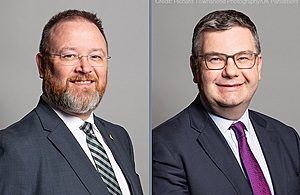Good afternoon and welcome to Downing Street for today’s coronavirus briefing.
We’re going to do things slightly differently today. I’m going to go through the charts. I’m joined by Professor John Newton from the test and trace programme. We’ll then answer questions from the public and from journalists.
If there’s one message that we have today it’s that it is incredibly important for anybody who has symptoms of coronavirus – a cough or a fever or a change in your sense of taste or smell – that you get a test.
It’s by people coming forward to get a test, which you can get on nhs.uk/coronavirus or by dialling 119. It’s by getting those tests that we’re able to identify those who have the virus, ensuring you get the best possible treatment and ensuring that we can then trace the virus and through that we can control the virus.
That is the most important message and what everyone can do to help control this virus.
The first slide shows testing capacity and new cases. Yesterday there were 128,437 tests in the UK, meaning there has been a total 4.48 million tests carried out since the start of this crisis. Of course testing capacity stands at a higher level, 206,444.
This shows there is extra capacity for more tests and tests are available right now on the website if you go to nhs.uk/coronavirus or dial 119. I want to highlight that because it’s so important that people come forward for a test and anyone who needs a test can get a test.
The next chart shows that there are 1,570 cases confirmed as of yesterday. This is the lowest number since 25 March. In total, 276,332 cases have been confirmed. But this number of 1,570 shows that we’ve seen continued downward progress is the number of new confirmed cases.
We’re getting this virus under control, which is why we can make the cautious, small, positive steps we’ve been able to make today. If we look at the number of admissions to hospital with COVID-19, 479. That’s down from a peak of 3,121 on 2 April. The proportion of people on mechanical ventilators, the number which corresponds to that 9% figure, is that there are 606 people on mechanical ventilators. Again, that is the lowest since late March.
The picture is repeated across the country. We’ve seen in almost every case the number of people in hospital with COVID-19 is the lowest since late March. As of yesterday there were 7,541 in hospital with COVID-19.
The final slide. Sadly, 39,045 people have died with coronavirus, confirmed with a positive test. That’s 111 yesterday. Again, that figure is the lowest figure since lockdown began on 23 March.
We can see from these charts the pattern right across the board, which is that we’re making significant progress, but that there is still more to be done.
I want to say a few notes of thanks: thanks to our volunteer responders who in their hundreds of thousands have come forward and stepped up to the plate.
Thanks to the charities and the charity groups who are working so hard in very difficult times.
Thanks to colleagues in the NHS and in social care. Also to the businesses, pharmaceutical companies and diagnostic companies, without whom we simply couldn’t have mounted this response.
To the pharmacists and the dentists, and I’m very pleased that dentistry is going to restart from next week. Especially for their hard work and their understanding, all of the families who stand behind those who are on the frontline.
At the start of pride season, I want to take a moment when we can’t get together as we normally would to thank all colleagues in the LGBT community who do so much in the NHS and across social care.
I think this data shows that the action plan is working. The data shows that we’re winning the battle against coronavirus.
Today, we’re therefore able to make some cautious changes to the lockdown rules, carefully and safely. Of course these are balanced judgements and we take these decisions very carefully.
We must all remember that, in the war against this virus, we are all on the same side. We’ve come so far together, we can take these steps together. But do not step too far. The disease is not done yet. We mustn’t throw away the progress that has been made.
Please take your responsibility seriously. If you have symptoms you must get a test and if the NHS asks you to isolate you must do so.
To everybody, stay alert, control the virus and save lives.
